Грег Иган - Distress
Здесь есть возможность читать онлайн «Грег Иган - Distress» весь текст электронной книги совершенно бесплатно (целиком полную версию без сокращений). В некоторых случаях можно слушать аудио, скачать через торрент в формате fb2 и присутствует краткое содержание. Жанр: Фантастика и фэнтези, на английском языке. Описание произведения, (предисловие) а так же отзывы посетителей доступны на портале библиотеки ЛибКат.
- Название:Distress
- Автор:
- Жанр:
- Год:неизвестен
- ISBN:нет данных
- Рейтинг книги:3 / 5. Голосов: 1
-
Избранное:Добавить в избранное
- Отзывы:
-
Ваша оценка:
- 60
- 1
- 2
- 3
- 4
- 5
Distress: краткое содержание, описание и аннотация
Предлагаем к чтению аннотацию, описание, краткое содержание или предисловие (зависит от того, что написал сам автор книги «Distress»). Если вы не нашли необходимую информацию о книге — напишите в комментариях, мы постараемся отыскать её.
Distress — читать онлайн бесплатно полную книгу (весь текст) целиком
Ниже представлен текст книги, разбитый по страницам. Система сохранения места последней прочитанной страницы, позволяет с удобством читать онлайн бесплатно книгу «Distress», без необходимости каждый раз заново искать на чём Вы остановились. Поставьте закладку, и сможете в любой момент перейти на страницу, на которой закончили чтение.
Интервал:
Закладка:
"That was our revolution. Beats measuring out your life in Molotov cocktails."
"Except that the theft means you’re saddled with the boycott."
Munroe shrugged. "The boycott is a great pain. But Stateless under the boycott is still better than the alternative: a company island, every square meter privately owned. It’s bad enough when every decent food crop on the planet is licensed; imagine the ground beneath your feet being the same."
I said, "Okay. So the technology gave you a shortcut to a new society; all the old models were irrelevant. No invasion and genocide, no bloody uprising, no glacial democratic reforms. But getting there’s the easy part. I still don’t understand what holds the place together."
"Small invertebrate organisms."
"I meant politically."
Munroe looked baffled. "Holds the place together against what? The onset of anarchy?"
"Violence. Looting. Mob rule."
"Why bother traveling to the middle of the Pacific for something you can do in any city in the world? Or do you think we went to all this trouble just for a chance to play Lord of the Flies?"
"Not intentionally. But when it happens in Sydney, they send in the riot squad. When it happens in Los Angeles, they send in the National Guard."
"We have a trained militia, who have near-universal consent to use reasonable force to protect people and vital resources in an emergency." He grinned. "Vital resources. Emergency powers. Sounds just like home, doesn’t it? Except that the emergency has never arisen."
"Okay. But why hasn’t it? "
Munroe massaged his forehead, and regarded me as if I were an over-persistent child. "Good will? Intelligence? Some other bizarre alien force?"
"Be serious."
"There are some obvious things. People turn up here with a slightly higher than average level of idealism. They want Stateless to work, or they wouldn’t have come—give or take the occasional tedious agent provocateur. They’re prepared to cooperate. I don’t mean living in dormitories, pretending everyone’s your extended family, and going on work parties singing uplifting communal anthems—though there’s some of that about. But they’re willing to be more flexible and tolerant than the average person who chooses to live elsewhere… because that’s the whole point.
"There’s less concentration of wealth, and of power. Maybe that’s only a matter of time—but with so much power so heavily decentralized, it’s very hard to buy. And yes, we have private property, but the island, the reefs, and the waters are a commons. Syndicates which collect and process food trade their products for money, but they have no monopoly; there are plenty of people who feed themselves directly from the sea."
I looked around the square, frustrated. "Okay. You’re not all slaughtering each other or rioting in the streets, because no one’s starving, and no one’s obscenely rich—yet. But do you honestly think it’s going to last? The next generation won’t be here by choice. What are you going to do—indoctrinate them all with tolerance, and hope for the best? It’s never worked before. Every other experiment like this has ended in violence, been conquered or absorbed… or given up and turned into a nation state."
Munroe said, "Of course we’re trying to pass on our own values to our children—like everyone else on the planet. And with about as much success. But at least most children here are taught sociobiology from an early age."
"Sociobiology?"
He grinned. "More use than Bakunin, believe me. People will never agree on the details of how society should be organized—and why should they? But unless you’re an Edenite who believes there’s some natural, Gala-given Utopian condition to which we should all return, then adopting any form of civilization means choosing some kind of cultural response—other than passive acceptance—to the fact that we are animals with certain innate behavioral drives. And whether that response involves the most subtle compromise, or the most vehement opposition, it helps to know exactly what it is you’re trying to accommodate, or oppose.
"If people understand the biological forces acting on themselves and everyone around them then at least they have a chance of adopting intelligent strategies for getting what they want with a minimum of conflict… instead of blundering around with nothing but romantic myths and wishful thinking, courtesy of some dead political philosopher."
I let that sink in. I’d come across no end of detailed prescriptions for ludicrous "scientific" Utopias, and blueprints for societies organized on allegedly "rational" grounds… but this was the first time I’d heard anyone advocate diversity in the same breath as acknowledging biological forces. Instead of exploiting sociobiology to try to justify some rigid political doctrine to be imposed from above—from Marxism to the nuclear family, from racial purity to gender separatism—"we must live this way, because human nature requires it"—Munroe was suggesting that people could use the self-knowledge of the species to make better decisions for themselves.
Informed anarchy. It was an appealing notion—but I still felt obliged to be skeptical. "Not everyone’s going to let their children learn sociobiology; there must be a few cultural and religious fundamentalists, even here, who’d find it too threatening. And… what about adult migrants? If someone’s twenty years old when they arrive on Stateless, they’ll still be around for another sixty years. Plenty of time to lose their idealism. Do you really think the whole thing can hold together while the first generation grow old and disillusioned?"
Munroe was bemused. "Does it matter what I think? If you really care one way or the other: explore the island, talk to people, make up your own mind."
"You’re right." I wasn’t here to explore the island, though, or to form an opinion on its political future. I glanced at my watch; it was after one. I stood up.
Munroe said, "There’s something going on right now which you might like to see. Or even… try. Are you in a hurry?"
I hesitated. "That depends."
"I suppose you could call this the closest thing we have to a… ceremony for new residents." I must have looked less than thrilled; Munroe laughed. "No anthems, no oaths, no gilded scrolls, I promise. And no, it’s not compulsory— it just seems to have become the fashion for new arrivals. Mere tourists are welcome, too, though."
"Are you going to tell me, or do I have to guess?"
"I can tell you that it’s called inland diving. But you really have to see it to know what that means."
Munroe packed up his easel and accompanied me; I suspected he was secretly enjoying playing veteran radical tour guide. We stood in the doorway to catch the breeze, as the tram headed out toward the northern arm of the island. The track ahead was barely visible: two parallel trenches carved in the rock, the gray ribbon of superconductor running down the middle all but hidden beneath a layer of fine chalky dust.
By the time we’d traveled about fifteen kilometers, we were the only passengers left. I said, "Who pays for the maintenance of these things?"
"Fares cover some of it. The syndicates pay the rest."
"So what happens if a syndicate decides not to pay? To freeload?"
"Then everyone knows."
"Okay, but what if they genuinely can’t afford to contribute. What if they’re poor?"
"Most syndicate finances are public knowledge. By choice, but it’s viewed as odd if they’re kept secret. Anyone on Stateless can pick up their notepad and find out if the wealth of the island is being concentrated in one syndicate or being siphoned off-shore, or whatever. And act on that knowledge as they see fit."
Читать дальшеИнтервал:
Закладка:
Похожие книги на «Distress»
Представляем Вашему вниманию похожие книги на «Distress» списком для выбора. Мы отобрали схожую по названию и смыслу литературу в надежде предоставить читателям больше вариантов отыскать новые, интересные, ещё непрочитанные произведения.
Обсуждение, отзывы о книге «Distress» и просто собственные мнения читателей. Оставьте ваши комментарии, напишите, что Вы думаете о произведении, его смысле или главных героях. Укажите что конкретно понравилось, а что нет, и почему Вы так считаете.
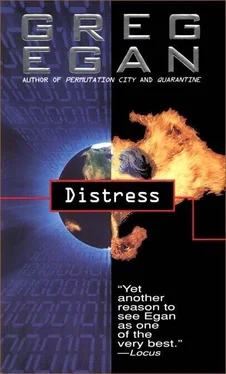

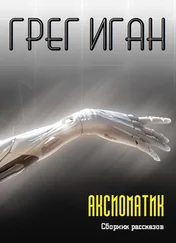

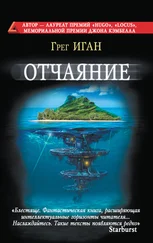
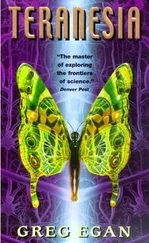
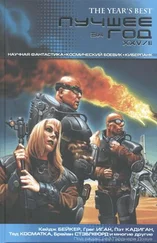


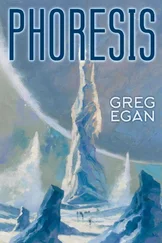
![Грег Иган - Рассказы [компиляция]](/books/419837/greg-igan-rasskazy-kompilyaciya-thumb.webp)
